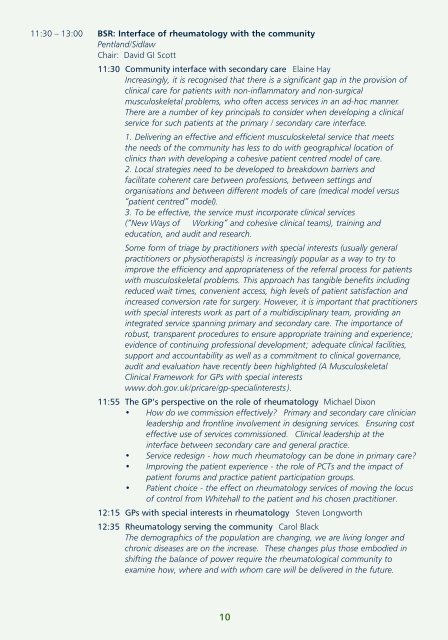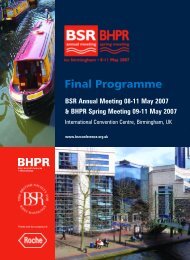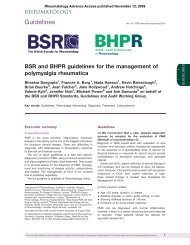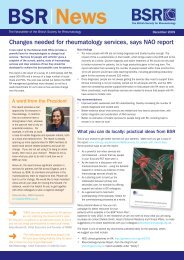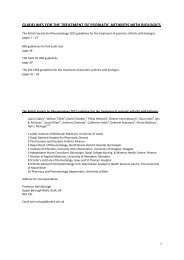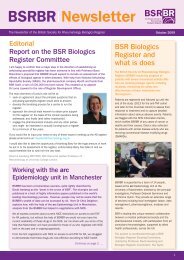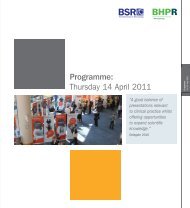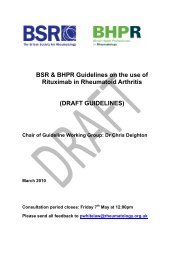View conference programme - The British Society for Rheumatology
View conference programme - The British Society for Rheumatology
View conference programme - The British Society for Rheumatology
Create successful ePaper yourself
Turn your PDF publications into a flip-book with our unique Google optimized e-Paper software.
11:30 – 13:00 BSR: Interface of rheumatology with the community<br />
Pentland/Sidlaw<br />
Chair: David GI Scott<br />
11:30 Community interface with secondary care Elaine Hay<br />
Increasingly, it is recognised that there is a significant gap in the provision of<br />
clinical care <strong>for</strong> patients with non-inflammatory and non-surgical<br />
musculoskeletal problems, who often access services in an ad-hoc manner.<br />
<strong>The</strong>re are a number of key principals to consider when developing a clinical<br />
service <strong>for</strong> such patients at the primary / secondary care interface.<br />
1. Delivering an effective and efficient musculoskeletal service that meets<br />
the needs of the community has less to do with geographical location of<br />
clinics than with developing a cohesive patient centred model of care.<br />
2. Local strategies need to be developed to breakdown barriers and<br />
facilitate coherent care between professions, between settings and<br />
organisations and between different models of care (medical model versus<br />
“patient centred” model).<br />
3. To be effective, the service must incorporate clinical services<br />
(“New Ways of Working” and cohesive clinical teams), training and<br />
education, and audit and research.<br />
Some <strong>for</strong>m of triage by practitioners with special interests (usually general<br />
practitioners or physiotherapists) is increasingly popular as a way to try to<br />
improve the efficiency and appropriateness of the referral process <strong>for</strong> patients<br />
with musculoskeletal problems. This approach has tangible benefits including<br />
reduced wait times, convenient access, high levels of patient satisfaction and<br />
increased conversion rate <strong>for</strong> surgery. However, it is important that practitioners<br />
with special interests work as part of a multidisciplinary team, providing an<br />
integrated service spanning primary and secondary care. <strong>The</strong> importance of<br />
robust, transparent procedures to ensure appropriate training and experience;<br />
evidence of continuing professional development; adequate clinical facilities,<br />
support and accountability as well as a commitment to clinical governance,<br />
audit and evaluation have recently been highlighted (A Musculoskeletal<br />
Clinical Framework <strong>for</strong> GPs with special interests<br />
www.doh.gov.uk/pricare/gp-specialinterests ).<br />
11:55 <strong>The</strong> GP’s perspective on the role of rheumatology Michael Dixon<br />
• How do we commission effectively? Primary and secondary care clinician<br />
leadership and frontline involvement in designing services. Ensuring cost<br />
effective use of services commissioned. Clinical leadership at the<br />
interface between secondary care and general practice.<br />
• Service redesign - how much rheumatology can be done in primary care?<br />
• Improving the patient experience - the role of PCTs and the impact of<br />
patient <strong>for</strong>ums and practice patient participation groups.<br />
• Patient choice - the effect on rheumatology services of moving the locus<br />
of control from Whitehall to the patient and his chosen practitioner.<br />
12:15 GPs with special interests in rheumatology Steven Longworth<br />
12:35 <strong>Rheumatology</strong> serving the community Carol Black<br />
<strong>The</strong> demographics of the population are changing, we are living longer and<br />
chronic diseases are on the increase. <strong>The</strong>se changes plus those embodied in<br />
shifting the balance of power require the rheumatological community to<br />
examine how, where and with whom care will be delivered in the future.<br />
10


